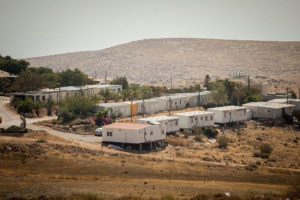Extremist settlers rapidly seizing West Bank land

Mitzpe Kramim settler outpost, West Bank, 29 August 2018
Jake Tacchi, Ziad Al-Qattan, Emir Nader & Matthew Cassel report in BBC Eye Investigations on 3 September 2024:
Last October, Palestinian grandmother Ayesha Shtayyeh says a man pointed a gun at her head and told her to leave the place she had called home for 50 years. She told the BBC the armed threat was the culmination of an increasingly violent campaign of harassment and intimidation that began in 2021, after an illegal settler outpost was established close to her home in the occupied West Bank.
The number of these outposts has risen rapidly in recent years, new BBC analysis shows. There are currently at least 196 across the West Bank, and 29 were set up last year – more than in any previous year.
The outposts – which can be farms, clusters of houses, or even groups of caravans – often lack defined boundaries and are illegal under both Israeli and international law.
But the BBC World Service has seen documents showing that organisations with close ties to the Israeli government have provided money and land used to establish new illegal outposts. The BBC has also analysed open source intelligence to examine their proliferation, and has investigated the settler who Ayesha Shtayyeh says threatened her.
Experts say outposts are able to seize large swathes of land more rapidly than settlements, and are increasingly linked to violence and harassment towards Palestinian communities.
Official figures for the number of outposts do not exist. But BBC Eye reviewed lists of them and their locations gathered by Israeli anti-settlement watchdogs Peace Now and Kerem Navot – as well as the Palestinian Authority, which runs part of the occupied West Bank.
We analysed hundreds of satellite images to verify that outposts had been constructed at these locations and to confirm the year they were set up. The BBC also checked social media posts, Israeli government publications and news sources to corroborate this and to show that outposts were still in use.
